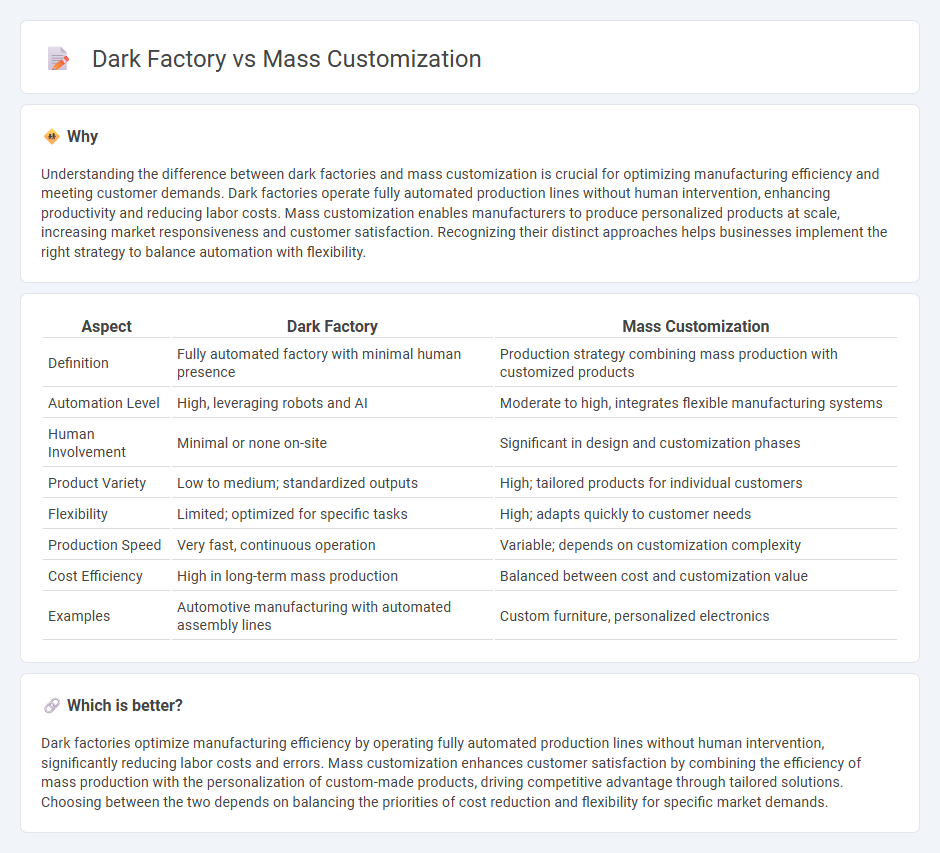
Dark factories leverage full automation and minimal human intervention to maximize efficiency and reduce labor costs, while mass customization focuses on producing tailored products at scale to meet diverse consumer demands. Advanced robotics, AI-driven processes, and IoT integration distinguish dark factories as the future of smart manufacturing. Explore how these innovative manufacturing approaches are transforming the industry landscape.
Why it is important
Understanding the difference between dark factories and mass customization is crucial for optimizing manufacturing efficiency and meeting customer demands. Dark factories operate fully automated production lines without human intervention, enhancing productivity and reducing labor costs. Mass customization enables manufacturers to produce personalized products at scale, increasing market responsiveness and customer satisfaction. Recognizing their distinct approaches helps businesses implement the right strategy to balance automation with flexibility.
Comparison Table
| Aspect | Dark Factory | Mass Customization |
|---|---|---|
| Definition | Fully automated factory with minimal human presence | Production strategy combining mass production with customized products |
| Automation Level | High, leveraging robots and AI | Moderate to high, integrates flexible manufacturing systems |
| Human Involvement | Minimal or none on-site | Significant in design and customization phases |
| Product Variety | Low to medium; standardized outputs | High; tailored products for individual customers |
| Flexibility | Limited; optimized for specific tasks | High; adapts quickly to customer needs |
| Production Speed | Very fast, continuous operation | Variable; depends on customization complexity |
| Cost Efficiency | High in long-term mass production | Balanced between cost and customization value |
| Examples | Automotive manufacturing with automated assembly lines | Custom furniture, personalized electronics |
Which is better?
Dark factories optimize manufacturing efficiency by operating fully automated production lines without human intervention, significantly reducing labor costs and errors. Mass customization enhances customer satisfaction by combining the efficiency of mass production with the personalization of custom-made products, driving competitive advantage through tailored solutions. Choosing between the two depends on balancing the priorities of cost reduction and flexibility for specific market demands.
Connection
Dark factories utilize advanced automation and AI to enable continuous, unmanned production, which supports mass customization by rapidly adapting manufacturing processes to create personalized products at scale. Integration of IoT sensors and real-time data analytics in dark factories enhances flexibility and precision, essential for meeting diverse customer specifications efficiently. This synergy reduces production costs and lead times while maintaining high quality, driving innovation in smart manufacturing.
Key Terms
**Mass Customization:**
Mass customization combines the efficiency of mass production with personalized product variations, leveraging advanced manufacturing technologies and flexible supply chains to meet diverse customer demands. This approach boosts customer satisfaction and brand loyalty by offering tailored products without significant cost increases. Explore how mass customization transforms industries by enhancing innovation and responsiveness to market trends.
Personalization
Mass customization empowers consumers by integrating flexible manufacturing with personalized product options, producing unique items at scale. Dark factories leverage automation and AI to operate without human presence, enhancing precision but limiting direct consumer interaction and personalization depth. Explore how these approaches transform personalized manufacturing and impact customer experiences.
Flexible Manufacturing Systems
Flexible Manufacturing Systems (FMS) enable mass customization by allowing rapid adjustment and efficient production of varied product designs tailored to individual customer preferences. In contrast, dark factories emphasize automation with minimal human intervention, optimizing continuous production but often favoring standardized outputs over highly customized ones. Explore how integrating FMS in dark factory environments can revolutionize manufacturing flexibility and efficiency.
Source and External Links
Mass Customization: A Complete Guide - Deskera - Mass customization is a business strategy that provides personalized products and services cost-effectively, involving strategies like understanding customer needs, using technology, automation, scalability design, and quality control.
Mass customization - Wikipedia - Mass customization combines low-cost mass production with flexible computer-aided systems to produce individually customized products efficiently, enhancing variety without increasing costs.
Guide to Mass Customization - Formlabs - Mass customization merges customization's individuality with mass production efficiency, featuring types like collaborative customization where customers co-create products and adaptive customization allowing product alteration by users after purchase.
 dowidth.com
dowidth.com